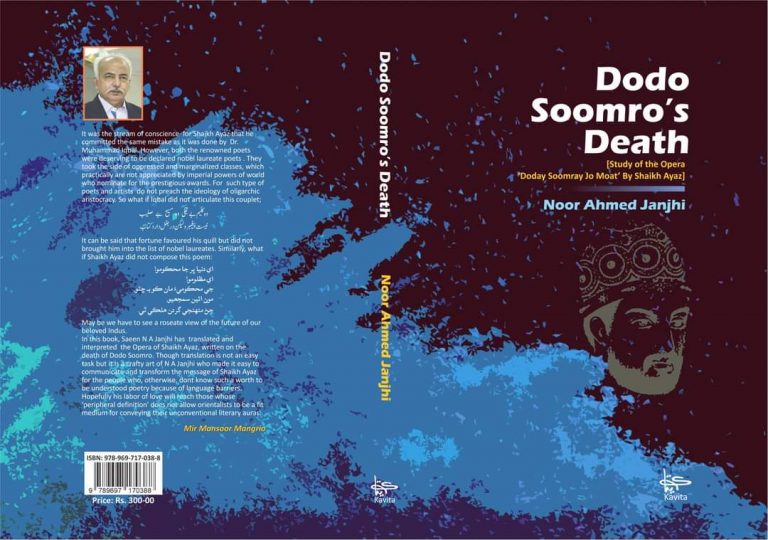
Though translation is not an easy task but Prof. Janjhi has made it easy to understand for the people, who have language barrier.
By Ghansham Narwani
It is good news of the new year for the book-lovers that a new book “Dodo Soomro’s Death” (English) authored by Prof. Noor Ahmed Janjhi, a well-known writer, poet and linguist, hailing from Tharparkar, has been published.
Before reflecting on book, I feel it necessary to share few words on the works and contributions of Prof Noor Ahmed Janjhi. He is highly literate person and man of letters, a learned man, intellectual, scholar, poet, critic, linguist, and educationist. His field of interest is very vast and stretching. He writes on Sufism, Latifiyat, socio-economic and political issues of country as well as the world. His analysis and observation are very deep and critical. His work is of classic worth. Being a native of Thar, he is an avid lover of flora and fauna of desert Thar and Parkar. He is a staunch admirer of folk wisdom and folklore which reverberates in his heart and soul. His works suggest that he is a treasure-trove, reformer, progressive, optimistic, and torch- bearer of our time. He has written 36 books so far, including six on the poetry of Shaikh Ayaz. This is his second book in English on Shaikh Ayaz. The title of the book is ‘Dodo Soomro’s Death’.
Originally it was written by Shaikh Ayaz in Sindhi with the title of “Dooday Soomray Jo Moat”. But Prof. Noor Ahmed has analyzed, interpreted, and translated the opera and especially its characterization. If one would go through this book, he meets with preface, which has been written by author himself. It deals with the development of Opera in the history. It tells that Opera, a dramatic work, originated in he 17th century in Latin language and is defined as “Musical work for the stage with singing character”.
The book contains four characters – Baghul Bai, Dodo, Chanesar and Chholi.
Story is about the Soomra Rule in Sindh. They had their Capital at Vighekot and the Roopa Mari was the Ceremonial Palace. Ruler died and left two sons Dodo and Chanesar, and their sister Baghul Bai. Dodo and Baghul are Protagonist whereas Chanesar as an Antagonist Character. At the death of their Father a controversy arose between Dodo and Chanesar. People wanted Dodo to be their next ruler, but being an elder Chanesar too claimed himself the true successor of his father. In this state of affairs, Chanesar had got support from the Sultan of Delhi. Consequently, the fight took place between the troops of Sindh and Delhi. Sindhi troops were defeated and Dodo was martyred. This whole story, Shaikh Ayaz has created in the form of Opera and dialogues are in the form of stream of consciousness, which is considered as highest figure of speech. Ayaz has produced it in a clear compact and classic form.
Same approach has been adopted by Prof. Noor Ahmed Janjhi while translating and analyzing its characterization. In this regard, the efforts of author are highly considerable. Firstly, he has a great command on English language and secondly, he knows all basics of literature and especially of translation.
Though translation is not an easy task but Prof. Janjhi has made it easy to understand for the people, who have language barrier.
Another portion of the book is about miscellaneous poetic work of Ayaz. Prof. Janjhi extols the poetry of Ayaz describing him ‘a cosmopolitan individual in his thinking with the focus on Sindh’. He says that Ayaz’s art was of Sindh, for Sindh and by Sindh. Further he advocated that Ayaz was the poet of bright dawn, and his works are also inter- connected in theme and thought with his predecessors, because he followed the path of Wahdat-ul-Wijood like Bhittai and other great poets.
By and large, the book is worth-reading and will create too much interest among the readers.
___________________
Ghansham Narwani is a young English graduate from Thar, and associated with the teaching.